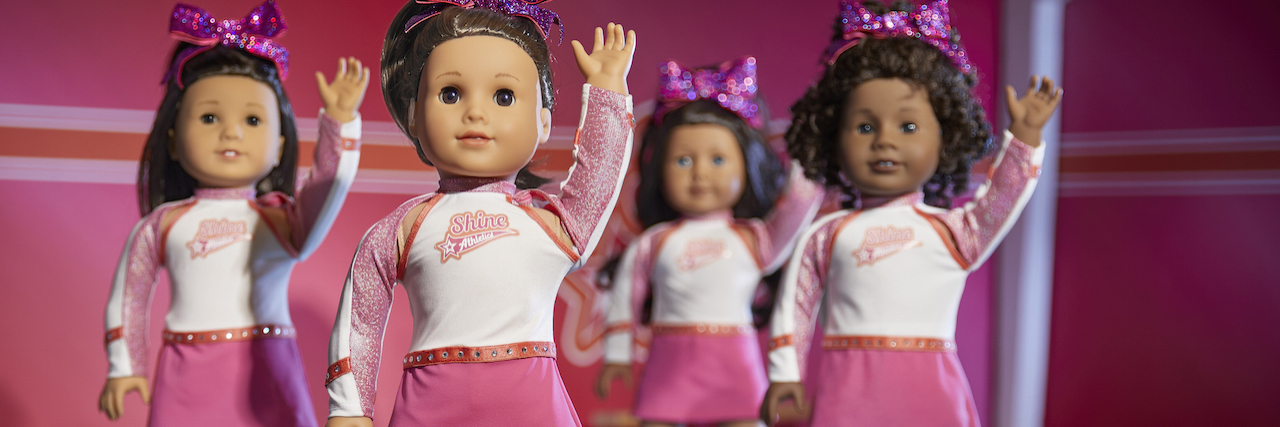What the 2020 American Girl Doll Means to Me as a Hard-of-Hearing Adult
Growing up, every school year started the same. There were inevitably a new set of kids who came in, and eventually the same question always came up:
“What are those things in your ears?”
We were kids, I don’t blame them — I would have been curious, too. It used to annoy me, but over time I joked with them, and as I grew up and spent my summers working at camps, I used to tell the kids I was a secret agent. They loved it.
Having hearing aids had its perks — I could turn them off when I didn’t want to listen to people anymore. I could leave classes and tell my teachers I had to change my hearing aid batteries. But growing up, the cons outweighed the pros. I loved music more than anything, and I couldn’t listen to it with “those things in my ears.” I had friends who hated subtitles, but I couldn’t understand movies or TV shows without them. I was constantly trying to guess what people were saying and laugh when other people laughed, though I had no clue what the joke actually was.
Looking back now, I can see clearly how being so ashamed of having hearing aids fed into my social anxiety. I felt like an outcast, despite the accommodations that were supposed to make me feel the exact opposite. So, I did what any kid would do. I tried to get rid of them. Threw them out. Tried to flush them down the toilet. I’ll forever be apologizing to my parents who dug in trash cans and toilets to get them out because 7-year-old me didn’t know how expensive they were. When I got older, I was much more discreet. I put them in my backpack so I could put headphones in instead (which also backfired when they would fall out of my backpack).
Growing up, I was never really a “doll” girl, but I played with them every now and then. However, I was a nerdy child and I loved to read. And my favorite series was American Girl Doll. Tears welled up in my eyes when I saw they just created their first hard-of-hearing doll, naming her “Girl of the Year.” They announced her story would be told over two books. Odds I’ll read them despite being 21? High. I think about how much I would have loved this as a kid. How much less alone I might have felt. How it might have made me more confident.
I told my father, and he responded, “That’s the most ridiculous thing I’ve ever heard.”
In an attempt to keep the peace, I politely told him, “I think it would have been really nice for me to see as a kid.”
He scoffed and replied, “I don’t know, I thought just pretending everything was normal and acting like it was nothing worked out fine.”
It was my brother’s birthday, we had people over and the last thing I wanted to do was fight. So, I just said, “I’m not getting into this right now,” and walked away.
My parents did their best with raising my older brother and I, who both were born with moderate to severe hearing loss in both ears. It was new to them, but they sacrificed a lot and advocated for us when we needed support. I am so thankful they forced me into 504 and IEP meetings, because I now know how many people do not have that support. But comments like my dad’s still hit a certain way. I wish it was something we had talked about more. I wish we hadn’t just pretended like nothing was different — because all it made me feel was more different.
I’m excited about the hard-of-hearing American Girl doll; I believe she will be a win for younger generations. My own win came when my senior year of high school rolled around and Bluetooth hearing aids came out. I remember my mom telling me with tears in her eyes that my brother and I would each get a pair. I remember going to my room and crying, amazed by what technology created. Growing up, I remember my audiologist telling me my only option to listen to music with hearing aids was an extra device I would have to wear around my neck. Self-conscious, awkward and socially anxious me would never entertain that.
The Bluetooth hearing aids are great. Music still isn’t loud enough for my preferences and the batteries drain incredibly fast, but it was an advance I never could have imagined. And I can’t wait to see what the future holds, both for hearing aid technology and increased representation of deaf and hard-of-hearing people in society.

